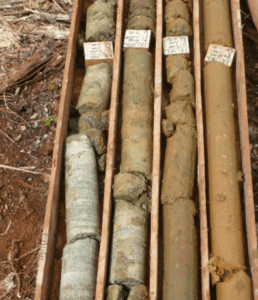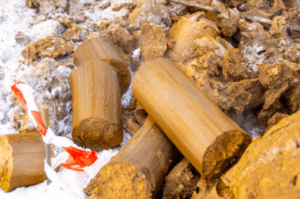Picture this: You’re standing on a freshly cleared worksite, plans in hand, ready to break ground. But what’s beneath your feet? Is the soil strong enough to support a highway enduring decades of traffic? Will a foundation crack under shifting ground? Without proper soil testing and borings, you’re taking a gamble with every structure you build.
At Earthlok Soil Stabilizer, we help even out the odds with our revolutionary soil stabilization process. Let’s take a look at the ins and outs of soil testing and why it’s critical for every construction project.
What is Soil Testing and Boring?
Soil testing is the process of analyzing ground conditions before construction begins. It helps determine whether the soil can support a structure, whether it needs stabilization, and how it might react to environmental changes over time.
Soil boring is a specific type of testing that involves drilling into the ground to collect samples from different depths. These samples give engineers a snapshot of the soil’s composition, moisture levels, and load-bearing capacity. It’s like taking a biopsy of the earth to ensure a structure has a solid, reliable foundation.

While soil sampling involves collecting loose material from the surface, boring digs deeper—literally and figuratively. This deeper look helps reveal potential issues like hidden moisture pockets, weak layers, or shifting soil that could wreak havoc down the line.
Why is Soil Testing Important in Construction?
If the ground beneath a building or highway isn’t stable, cracks, sinkholes, or structural failures can follow. Soil testing helps construction managers, engineers, and planners avoid these costly disasters by:
- Assessing soil composition: Knowing the mix of sand, clay, silt, and rock helps determine how the ground will behave under pressure.
- Preventing foundation failures: Unstable soil can shift over time, leading to building cracks, road buckling, and safety hazards.
- Ensuring compliance with safety regulations: Construction projects must meet engineering and environmental standards to pass inspections and maintain long-term durability.
Soil Testing Procedures and Analysis
The soil testing process isn’t just about digging holes and sending dirt to a lab. It’s a systematic approach to understanding what’s happening underground. Here’s how it typically unfolds:
First, there is a site evaluation where engineers examine the terrain and identify key locations for testing.
Next comes critical soil boring and sampling. During this process, we use drills to extract samples from different depths, ensuring a complete picture of the subsurface.
Experts then test for moisture content, density, permeability, and load-bearing capacity.
Finally, engineers use the data to determine if the soil is suitable as-is or if stabilization is needed.
Earthlok partners with independent testing labs to analyze soil injection results, unlike some competitors. This means you get unbiased, accurate assessments of how stabilization treatments perform—helping you build with confidence.

Applications of Soil Testing in Various Projects
Every new construction project benefits from soil testing, whether it’s a small residential build or a massive highway expansion.
- Residential Construction: Home foundations need solid, stable ground to prevent cracks and shifting. Testing helps homeowners and builders avoid foundation repairs down the road.
- Commercial Projects: Large buildings require soil that can support heavy loads without sinking or settling.
- Road and Highway Construction: Weak soil leads to potholes, road heaving, and premature wear. Testing ensures roads remain smooth and durable.
- Environmental Assessments: Soil testing helps identify contamination risks, ensuring land is safe for development.
Benefits of Soil Boring for Construction Projects
Soil boring isn’t just a procedural formality—it’s the backbone of a successful construction project. A thorough analysis of the soil’s load-bearing capacity allows engineers to design foundations that won’t shift, crack, or fail over time.
Without this crucial step, unexpected soil conditions can throw a wrench into timelines and budgets, leading to costly delays and emergency repairs.
Choose Earthlok for Essential Soil Testing and Boring
At Earthlok, we don’t just test soil—we stabilize it. Our liquid soil stabilization injections create a stronger, more reliable foundation by preventing ground shifting before it starts. Whether you’re planning a highway, commercial development, or residential project, our expertise helps you build with confidence.
Soil testing isn’t just an extra step—it’s the foundation of a successful project. Without it, you’re guessing. With it, you’re making informed, cost-effective decisions that lead to safer, longer-lasting construction.
Don’t compromise on your foundation. Schedule a soil test with our experts today!


